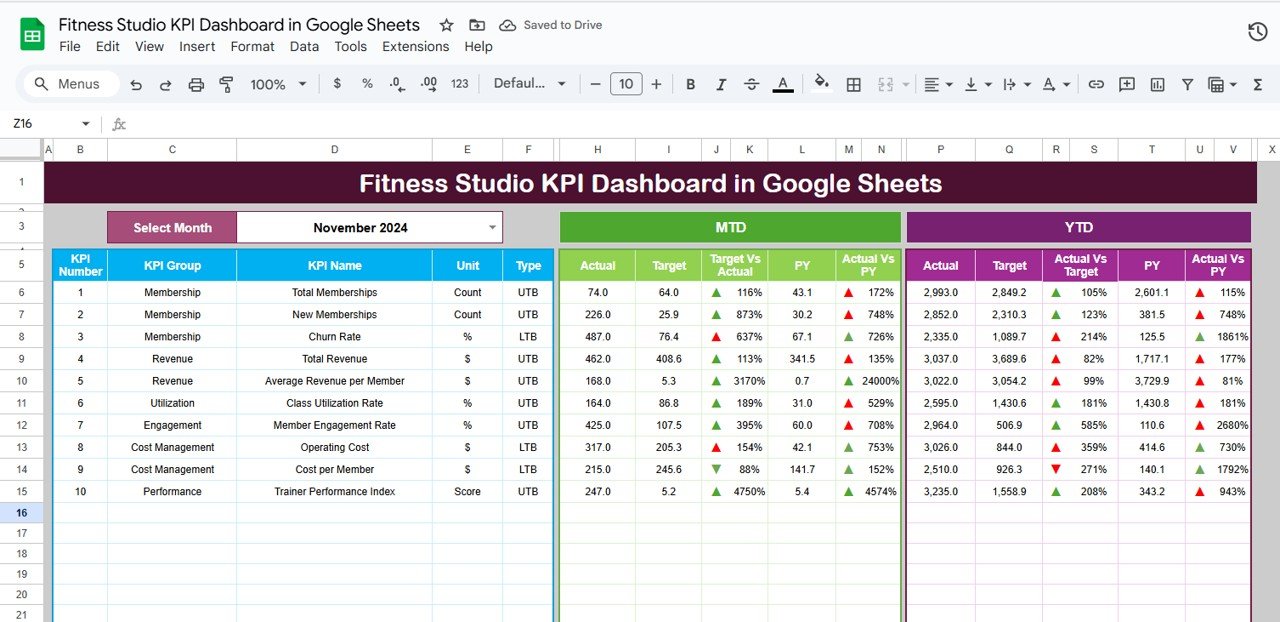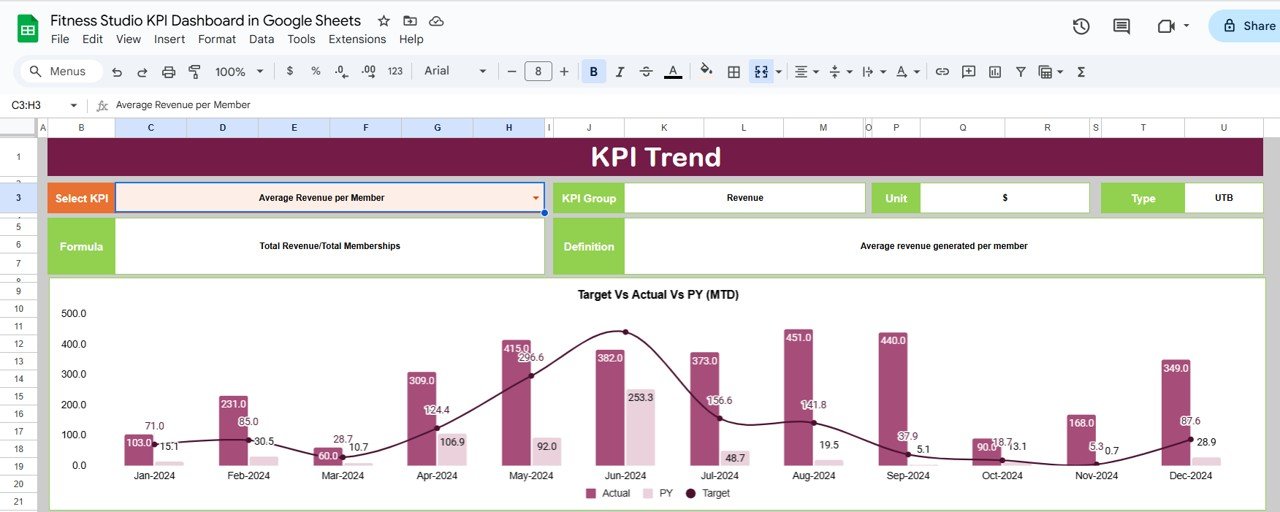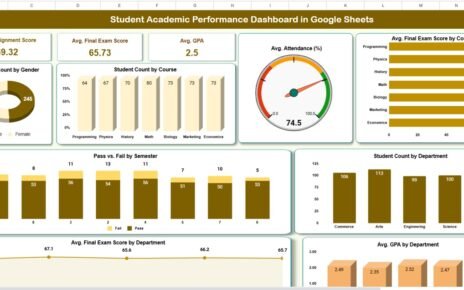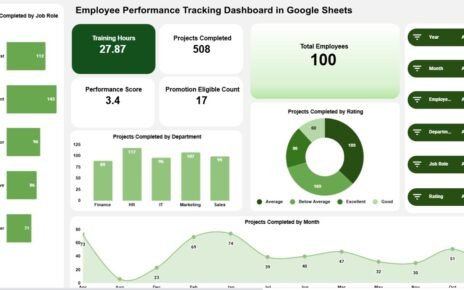Running a fitness studio successfully requires tracking multiple metrics, from membership growth and attendance to revenue and trainer performance. The Fitness Studio KPI Dashboard in Google Sheets provides a ready-to-use, interactive solution for monitoring key performance indicators (KPIs) and making data-driven decisions.
In this article, we’ll explain the features, benefits, and best practices for using this dashboard.
What Is a Fitness Studio KPI Dashboard?
A Fitness Studio KPI Dashboard consolidates all essential fitness studio metrics into a single Google Sheets file. It allows managers to track monthly and yearly performance, compare actuals against targets, and identify trends.
Key benefits include:
-
Tracking MTD (Month-to-Date) and YTD (Year-to-Date) performance
-
Comparing current performance with previous year data
-
Identifying top-performing trainers, memberships, and programs
-
Visualizing KPIs with conditional formatting, charts, and cards
Key Features of the Fitness Studio KPI Dashboard
Click to Buy Fitness Studio KPI Dashboard in Google Sheets
This dashboard consists of 6 worksheets designed to provide comprehensive performance insights:
1. Dashboard Sheet Tab
The Dashboard Sheet is the main page where all KPI information is displayed:
Cards:
-
Total Memberships
-
Active Members
-
Average Session Attendance
-
Revenue
-
Trainer Performance Score
Charts:
-
Membership Growth by Month
-
Attendance Trends by Program
-
Revenue by Membership Type
-
Trainer Performance by Class
Features:
-
Dropdown to select the month (Range D3) dynamically updates all data
-
Conditional formatting arrows to indicate performance vs targets and previous year

Click to Buy Fitness Studio KPI Dashboard in Google Sheets
2. KPI Trend Sheet Tab
The KPI Trend Sheet provides detailed analysis of each KPI:
-
Select a KPI from the dropdown (Range C3)
-
Displays KPI Group, Unit, Type (Upper-the-Better or Lower-the-Better)
-
Shows KPI formula and definition
-
Tracks trends over time to identify areas of improvement

3. Actual Number Sheet Tab
-
Enter actual MTD and YTD numbers for each KPI
-
Change the first month of the year in Range E1 to update calculations
-
Ensures dashboard reflects real-time performance metrics

Click to Buy Fitness Studio KPI Dashboard in Google Sheets
4. Target Sheet Tab
-
Enter monthly and yearly targets for each KPI
-
Compare actual performance with goals to monitor success
-
Supports both MTD and YTD tracking

5. Previous Year Number Sheet Tab
-
Enter previous year numbers for all KPIs
-
Enables year-over-year comparisons
-
Provides historical context for decision-making

Click to Buy Fitness Studio KPI Dashboard in Google Sheets
6. KPI Definition Sheet Tab
-
List KPI Name, Group, Unit, Formula, Definition, and Type (Upper-the-Better or Lower-the-Better)
-
Acts as a reference to maintain consistency in measurement and reporting

Examples of KPIs in a Fitness Studio Dashboard
-
Total Memberships (Upper-the-Better)
-
Active Members (%) (Upper-the-Better)
-
Revenue ($) (Upper-the-Better)
-
Average Session Attendance (Upper-the-Better)
-
Trainer Performance Score (Upper-the-Better)
-
Member Retention Rate (%) (Upper-the-Better)
-
Class Utilization Rate (%) (Upper-the-Better)
Each KPI should have a defined unit, formula, and type (Upper or Lower the Better) for accurate tracking.
Advantages of Using the Dashboard
Click to Buy Fitness Studio KPI Dashboard in Google Sheets
-
Centralized Data: Track all studio KPIs in one place
-
Visual Insights: Charts and cards provide instant understanding
-
Track Trends: Analyze performance MTD, YTD, and year-over-year
-
Identify Underperforming Areas: Detect low attendance classes or underperforming trainers
-
Customizable: Add or remove KPIs as needed
-
Data-Driven Decisions: Optimize studio operations and improve member engagement
Best Practices for Using the Dashboard
-
Update Actuals Regularly: Keep the dashboard accurate by entering monthly data
-
Set Clear Targets: Define realistic targets for memberships, revenue, and attendance
-
Track Retention Rates: Monitor retention to identify churn and improve engagement
-
Analyze Trainer Performance: Use KPI trends to support or train staff
-
Segment Metrics by Program or Location: Identify high-performing classes or branches
-
Use Conditional Formatting: Highlight areas that need immediate attention
How the Dashboard Helps Studio Managers
Click to Buy Fitness Studio KPI Dashboard in Google Sheets
-
Optimize Class Schedules: Understand attendance patterns
-
Increase Membership Engagement: Track active members and retention
-
Boost Revenue: Monitor revenue trends and adjust pricing or promotions
-
Enhance Trainer Performance: Identify top performers and support improvement areas
-
Plan Marketing Campaigns: Focus on programs or memberships that drive growth
Frequently Asked Questions (FAQs)
Click to Buy Fitness Studio KPI Dashboard in Google Sheets
Q1: Can I add new KPIs to the dashboard?
Yes, the dashboard is fully customizable. Add or remove KPIs in the KPI Definition sheet and update actuals and targets accordingly.
Q2: Can this dashboard track multiple studio locations?
Absolutely. Include a location column in the data sheet to track metrics by branch.
Q3: How often should I update data?
Monthly updates are recommended, though weekly updates can provide more real-time insights.
Q4: Can I track trends over time?
Yes, the KPI Trend sheet provides month-by-month and year-to-date analysis.
Q5: Do I need advanced Excel knowledge to use this dashboard?
No, it’s ready-to-use with clear input fields and prebuilt charts.
Conclusion
The Fitness Studio KPI Dashboard in Google Sheets is a comprehensive tool for tracking memberships, attendance, revenue, and trainer performance. By consolidating data into a single, interactive dashboard, fitness studio managers can make data-driven decisions, improve operations, and enhance member engagement.
Visit our YouTube channel to learn step-by-step video tutorials
Youtube.com/@NeotechNavigators



